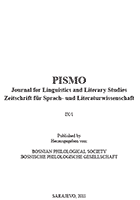Colonial Discourse and the Critique of Colonialism in Conrad’s “an Outpost of Progress”
Colonial Discourse and the Critique of Colonialism in Conrad’s “an Outpost of Progress”
Author(s): Amina ArnautovićSubject(s): Literary Texts
Published by: Bosansko filološko društvo
Keywords: Joseph Conrad; “An outpost of Progress”; discourse; colonial discourse; narrator; tone of voice; the voice of the colonizer; the critical voice
Summary/Abstract: Offering an analysis of Joseph Conrad´s short story “An Outpost of Progress”, the following text discusses two conflicting discourses which obviously are at work in the construction of Conrad´s story. The author, caught in the colonial discourse of the late Victorian Age, gives his narrator two quite different tones of voice, namely the voice of the colonizer and the voice critical of colonialism. The question is which of these two voices is more powerful? What is the point in the narrator’s critique of European culture? The questions are treated in two consecutive chapters, the first one dealing with the colonialist discourse in the story and the second one dealing with the critique of colonialism and Western civilisation. The following discussion is based on different colonial discourse theories as well as different writers’ interpretation of Conrad’s story.
Journal: Pismo - Časopis za jezik i književnost
- Issue Year: 2011
- Issue No: 09
- Page Range: 266-281
- Page Count: 16
- Language: English

